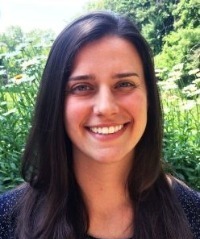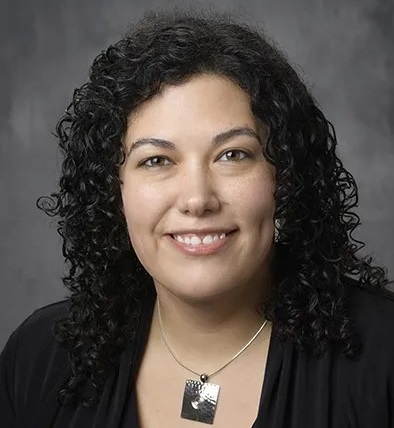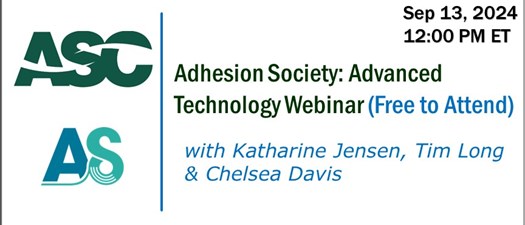Advanced Technology Webinar - Adhesion Society (FREE)
A link to the GoToWebinar platform will be provided once your registration is processed. You will need to click and enter your name and email in order to receive the JOIN link.
Event Details
This a Free to Attend webinar for everyone.
This webinar brought to you in collaboration with the Adhesion Society will highlight the award winners from the 2024 Adhesion Society meeting. The webinar will include an introduction from Chelsea Davis (Chair, Adhesion Society & University of Delaware) followed by presentation from Katharine Jensen (Williams College) and Tim Long (Arizona State University). Katharine Jensen received the 2024 Early Career adhesion Scientist Award sponsored by ASC on the research about mechanics of soft materials and highly deformable interfaces, including work with soft adhesive materials, fluid surface instabilities, and the biophysics of plants harnessing energy from water. Prof. Tim Long received the 2024 Excellence in Adhesion Science award sponsored by 3M for his groundbreaking work in the areas of novel polymeric design, functional polymers and adhesive systems and sustainable materials/processes.
Presentation Details:
Katharine Jensen will present on "Elastocapillary Adhesion with Soft Gels" discuss the emergence of capillary forces playing key roles in adhesion with highly compliant materials. Recent studies have demonstrated that solid surface tension can compete with or dominate over bulk elasticity in governing contact mechanics on small length scales, and mounting evidence suggests that the internal free fluid phase of compliant polymer gels also contributes significantly to mechanical response via both poroelasticity and classic capillary wetting. This talk will discuss investigations of this dual role for capillarity—both solid and liquid—in adhesion with soft polymer gels. The experiments combine mechanical manipulation and force measurements with sensitive, high-speed 2D and 3D optical imaging to measure adhesion with polydimethylsiloxane (PDMS) gels in both static and dynamic contexts. Varying parameters such as asperity size, adhesion energy, and gel material properties, offers insight into the fundamental physical processes that dominate soft contact with rough surfaces across length and time scales.
Tim Long will present "Sticking with Adhesion: Thinking at the Molecular Level" and highlight the recent advances in additive manufacturing (3D printing) and point to the complex challenged for adhesion and interfacial design. Polymer compositions range from polydiene elastomers to high temperature polyimides where geometric shape of printed objects broadens the property profiles for diverse families. The lecture will highlight photochemical processes where vat photopolymerization provides exceptional parts with precise resolution, smooth surface finish, and isotropic material properties. Common adhesive families from acrylics, siloxanes, polyurethanes, and polyimides will be described with a complement of novel chemical design and printed geometries.
Agenda
Elastocapillary Adhesion with Soft Gels by Prof. Katharine Jensen
Details Coming Soon
Sticking with Adhesion: Thinking at the Molecular Level by Prof. Tim Long
- Introduction to adhesive challenges
- Nature-inspired PSAs with hydrogen bonding
- Printing aqueous colloids as elastomers
- Printing high performance structural adhesives
SPEAKERS
Katharine E. Jensen
Assistant Professor of Physics, Williams College

Prof. Katharine Jensen earned her A.B. in Physics at Princeton in 2004, then spent two years as a researcher at MIT Lincoln Laboratory. She completed her Ph.D. in Physics at Harvard in 2013 studying structures and defects in hard-sphere colloidal crystals and glasses. Her postdoctoral research investigating soft interface mechanics started at Yale in the Department of Mechanical Engineering and Materials Science and later moved to the Department of Materials at ETH Zürich. She is currently an Associate Professor of Physics at Williams College, where her work studying mechanics of soft interfaces has been recognized with research grants from the National Science Foundation and the American Chemical Society as well as the 2023 Outstanding Early Career Adhesion Scientist Award from the Adhesion Society.
Timothy Long
Professor, School of Molecular Sciences
Arizona State University

Tim Long received his Ph.D. in Chemistry from Virginia Tech, and he subsequently joined both Eastman Kodak and Eastman Chemical companies for eight years upon graduation. He joined the faculty in the Department of Chemistry at Virginia Tech, where he also served as the Director of the Macromolecules Innovation Institute until 2019. In 2020, Prof. Long accepted an interdisciplinary faculty position across the School of Molecular Sciences (SMS) and the School for Engineering Matter, Transport, and Energy (SEMTE) at Arizona State University (ASU) where he launched and now leads the Biodesign Center for Sustainable Macromolecular Materials and Manufacturing (BCSM3). In addition to over 440 peer-reviewed publications, his research awards include the 2023 3M Excellence in Adhesion Award, 2022 Paul J Flory Award, 2020 Virginia Outstanding Faculty Award, 2015 Virginia Scientist of the Year, 2010 Virginia Tech Alumni Research Award, ACS PMSE Collaborative Research Award, PSTC Carl Dahlquist Award, 2019 ACS Rubber Division Thermoplastic Elastomer Award, and the ACS POLY Mark Scholar Award. His most recent research efforts address the need for tailored advanced macromolecules for advanced manufacturing (3D printing), including vat photopolymerization, direct ink write, binder jetting, powder bed fusion, and melt extrusion. His research ranges from controlled polymerization processes for block copolymers to high performance engineering polymers for emerging technology with a lens of earth sustainability.
Chelsea Davis
Associate Professor, University of Delaware

Dr. Davis received a B.S. in Textile Engineering from North Carolina State University in 2005. She then obtained her M.S. and Ph.D. in Polymer Science and Engineering from the University of Massachusetts Amherst in 2007 and 2012, respectively, supervised by Dr. Alfred Crosby. From 2012-2013, Dr. Davis was a Michelin Postdoctoral Research Fellow at the ESPCI ParisTech working with Dr. Costantino Creton and Dr. Anke Lindner. She went on to complete a National Research Council Postdoctoral Fellowship in the Polymers and Complex Fluids Group at the National Institute of Standards and Technology (NIST) from 2013 to 2016. In 2017, she established the Illuminating Interfacial Mechanics Lab in the School of Materials Engineering at Purdue University. Dr. Davis joined the University of Delaware in 2023 as an associate professor in the Department of Mechanical Engineering and the Department of Materials Science and Engineering.

